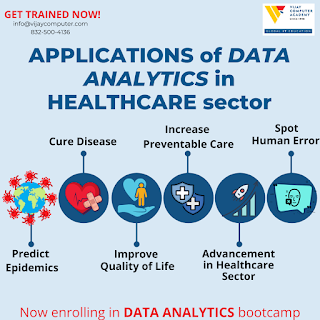Data Analytics in Healthcare
There are few things in the world requiring such precision as clinical decision-making. The adoption of data analytics supports healthcare organizations from population monitoring, health records, diagnostics, and clinical decisions, to drug procurement, and accounting. Data analytics not only support actual treatment and data management, but also help optimize healthcare operations all over the industry. In particular, they enable us to process the growing amount of accumulated medical data.
For hospitals and healthcare managers, healthcare data analytics provide a combination of financial and administrative data alongside information that can aid patient care efforts, better services, and improve existing procedures.
Healthcare analytics is the process of analyzing current and historical industry data to predict trends, improve outreach, and even better manage the spread of diseases. It can reveal paths to improvement in patient care quality, clinical data, diagnosis, and business management.
Here are 5 ways in which Data Analytics can help and change the entire scenario of the Healthcare sector.
One classic problem that any shift manager faces is the number of people to put on staff at any given time period. If you put on too many workers, you run the risk of having unnecessary labor costs add up. Too few workers, you can have poor customer service outcomes – which can be fatal for patients in that industry. By analyzing hospital datasets, the data analytics teams can forecast patient loads and help in planning resource allocation by utilizing online data visualization that reaches the goal of improving the overall patients' care.
Health Tracking
Data Analytics along with the Internet of Things (IoT), is revolutionizing the way one can track various user statistics and vitals. Apart from the basic wearables that can detect the patient’s sleep, heart rate, exercise, distance walked, etc. there are new medical innovations that can monitor the patient’s blood pressure, pulse Oximeters, glucose monitors, and more. The continuous monitoring of the body vitals along with the sensor data collection will allow healthcare organizations to keep people out of the hospital since they can identify potential health issues and provide care before the situation goes worse.
Assisting High-Risk Patients
If all the hospital records are digitized, it will be the perfect data that can be accessed to understand the pattern of many patients. Data analytics can identify the patients approaching the hospital repeatedly and identify their chronic issues. Such understanding will help in giving such patients better care and provide an insight into corrective measures to reduce their frequent visits. It is a great way to keep a list and check on high-risk patients and offer them customized care.
Preventing Human Errors
In several cases, it has been noted that the professionals tend to either prescribe a wrong medicine or dispatch a different medication by mistake. Such errors, in general, can be reduced since Data Analytics can be leveraged to analyze user data and the prescribed medication. It can corroborate the data and flag potential out of place prescription to reduce mistakes and save lives. Such software can be a great tool for physicians who cater to many patients in a day.
Cost and Effectiveness
Data analytics can be used to compare the cost and effectiveness of treatments, public policies etc. Organizations can use cost and outcome data to check the effectiveness of medicines and stop prescribing medicines that are not effective.
Predicting Outbreaks
Data analytics can also predict trends in the spread of illness, allowing doctors’ offices, hospitals, schools, and individuals to adequately prepare. Analyzing data to predict future spikes of the coronavirus (COVID-19) pandemic, can help hospitals ensure staff have enough personal protective equipment and patient beds. It can also enable school administrators to decide whether in-person learning is a safe option, and individuals to make sound choices regarding personal safety and hygiene, social distancing, and travel.
Advancement in Healthcare Sector
Apart from the current scenario, Data Analytics can be a great benefit for advancement in science and technology. For Healthcare, Artificial Intelligence, such as IBM’s Watson can be used to surf through numerous data within seconds to find solutions for various diseases. Such advancement is already in progress and will continue to grow with the amount of research collected by Big Data. It will not only be able to provide accurate solutions, but also offer customized solutions for unique problems. The availability of predictive analysis will assist patients traveling to a particular geographical location by studying similar patients in that area.
Thus, to sum up, Data Analytics increases the ability of the healthcare sectors to:
- Predict Epidemics
- Cure Disease
- Improve Quality of Life
- Increase Preventable Care
- Begin Early Preventive Care
- Spot Warning Signs Sooner
Want to take your healthcare institution to the next level?
Start building your own analysis and reports, and improve your healthcare data management with VCA.
Taking Vijay Computer Academy DATA ANALYTICS Bootcamp can equip you with the tools to derive powerful insights, predict trends, and make data-backed decisions.
Schedule a zoom meeting to discuss VCA's free consultancy services to identify your training needs and preparing training grant proposals : https://calendly.com/vijaycomputeracademy
- Curious about a high paying career in tech but don't know where to start? Schedule your discovery call today!
- Passionate about empowering the next generation of digital talent? Become VCA brand-ambassador
Call / WhatsApp : +1.832.500.4136 E-mail: info@vijaycomputer.com











Comments
Post a Comment